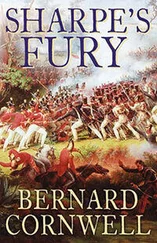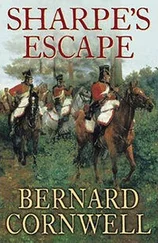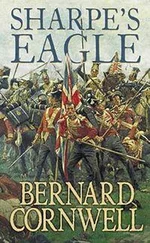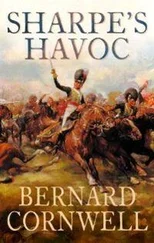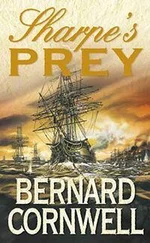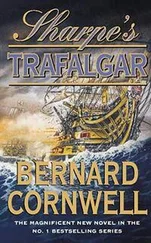He pushed the map away, uncorked his canteen, and took a drink of cold tea. Then he took off his hat which left the mark of its rim indented in his unwashed hair. He rubbed his face, yawned, then crammed the hat back onto his head. He clicked his tongue, urging the horse to the end of the embanked cutting from where there was a distant view across the low hills north of Charleroi. Dust was pluming from a road in the centre of that landscape, but, even with the help of the battered old telescope, Sharpe could not tell what traffic made the dust rise, or in what direction it travelled.
There could have been an innocent explanation for the dust cloud: it could have been caused by a herd of cows being driven to market, by a Prussian regiment on exercise, or even by a work gang hammering cobbles into the highway’s bed of chalk and flint, yet the musket-fire Sharpe had heard earlier, and the presence of the enemy Dragoons on the southern bank of the Sambre suggested a more sinister cause.
Invasion? For days now there had been no news from France, evidence that the Emperor had forbidden all traffic over the border, but that silence did not necessarily suggest an immediate invasion, but rather the concealment of exactly where the French forces concentrated. The best allied intelligence insisted that the French would not be ready till July, and that their attack would advance through Mons, not Charleroi. The Mons road offered the shortest route to Brussels, and if Brussels fell the Emperor would have succeeded in driving the British back to the North Sea and the Prussians back across the Rhine. Brussels, to the French, spelt victory.
Sharpe urged his horse down the rutted lane that dropped into a shallow valley before climbing between two unhedged pastures. He veered to his right, not wanting to betray his presence with dust from the dry mud of the lane. The mare was breathing hard as she trotted up the pastureland. She was accustomed to exercise for, each morning for the past two weeks, Sharpe had saddled her at three o’clock, then ridden her south to watch the dawn break over the Sambre valley, but this morning, hearing the crackle of musketry to the east, he had ridden the mare much further than usual. The day also threatened to be the hottest of the summer, but Sharpe’s fears of the enemy’s mysterious appearance made him force the beast onwards.
If this was the French invasion then the news of it must reach the allied headquarters quickly. The British, Dutch and Prussian armies guarded eighty miles of vulnerable Dutch frontier; the Prussians to the east and the British and Dutch to the west. The allied forces were spread like a net to trap an emperor, but as soon as the Emperor touched the net it was supposed to contract and entangle him. That was the stratagem, but the Emperor was as aware of those allied hopes as any British or Prussian officer and he would be planning to slash the net into two pieces and separately tear them apart. Shape’s urgent ‘duty was to discover whether this was the Emperor’s slashing stroke, or merely a cavalry raid launched deep into the Belgian province.
From the crest of the next hill he saw more French Dragoons. They were half a mile away, but on Sharpe’s side of the river and barring his approach to Charleroi. They saw him and kicked their horses forward so Sharpe turned his tired mare northwards, and spurred her into a gallop. He crossed the road, thumped across a pasture, then dropped into a small valley where a tangle of thorns grew either side of a trickling brook. Sharpe forced his horse through the bushes, then turned east again. He could see a wood far ahead of him. If he could make the shelter of the trees he thought there might be a chance of watching the high road from the wood’s far side.
The French Dragoons, content with having chased the lone horseman away, did not follow him. Sharpe slapped the mare’s neck which was wet with sweat. “Come on, girl! Come on!” She was a six-year-old hunter, docile and strong; one of the horses that Sharpe’s friend Patrick Harper had fetched from Ireland.
It was cooler and very quiet in the wood that was tangled with old huge trees. Nosey trotted close at the mare’s heels. Sharpe went slowly, threading the horse between the ancient trunks and past fallen, moss-covered logs. Long before he reached the edge of the wood he knew this was no mere cavalry raid. He knew because he heard the distinctive, never-forgotten thump and jangle of artillery on the move.
He curbed the horse, dismounted, and tied her reins to a low branch of oak. From his saddlebag he took a length of rope that he knotted as a leash round Nosey’s neck, then he drew his rifle out of the saddle holster, cocked it, and went silently forward. He held the dog’s rope in his left hand, the rifle in his right.
The wood ended at a wheat field that sloped downhill to the unhedged road from which the dust was rising to hang in the hot air. Sharpe, his telescope open, stared down at the old, familiar enemy.
French infantry, in their blue coats, were marching in the trampled wheat either side of the road so as to leave the harder road surface for the artillery. The guns were twelve-pounders. Every few minutes the guns would halt as some obstruction worked its way down the long column. Staff officers galloped fine horses down the road’s wide verges. On the far slope of the valley a troop of Red Lancers cantered through a wheat field, each horse leaving a straight trail of crushed plants.
Sharpe had no watch, but he estimated that he stayed at the edge of the wood for two hours during which time he counted twenty-two guns and forty-eight supply wagons. He also saw two carriages that might have been carrying senior officers, and he flirted with the idea that one of the carriages might have belonged to the Emperor himself. Sharpe had fought the French for over twenty years, yet he had never seen the Emperor and, all unbidden, a sudden and childish image of a man with cloven tail, sharp horns and demonic fangs stalked Sharpe’s fears that were made worse by the Emperor’s real reputation as a soldier of genius whose presence on a battlefield was worth a whole corps of men.
Still the French marched north. Sharpe counted eighteen infantry battalions and four squadrons of cavalry, one of which, composed of Dragoons, rode very close to his hiding place at the wood’s edge, but none of the French troopers glanced left to see where the Englishman and his dog lay in the shadows. The French horsemen were close enough for Sharpe to see their cadenettes, the pigtails which framed each man’s face as a mark of distinction. Their equipment looked good and new, and their horses were well fed. In Spain the French had whipped and ridden their horses to destruction, but these troops were freshly mounted on strong and healthy animals.
Newly mounted cavalry, eighteen battalions of infantry and twenty-two cannon did not constitute an army, but they certainly added up to a threat. Sharpe knew he was seeing much more than a cavalry raid, though he was not certain whether this was the real invasion. It was possible that these men were nothing but a strong feint designed to draw the.allies towards Charleroi while the real French thrust, fuelled by the Emperor’s presence, attacked twenty-five miles to the west at Mons.
Sharpe slithered back from the treeline and climbed wearily into the saddle. His job now was to let the allied headquarters know what he had seen: that the French had crossed the frontier and that the campaign had therefore begun. Sharpe remembered that Lucille, who had loyally left France to stay at his side, had been invited to some fashionable and expensive ball that was supposed to take place in Brussels this night. The expense would all go for nothing now because the Emperor had just rewritten the social calendar. Sharpe, who hated dancing, smiled at the thought, then turned and spurred the horse towards home.
Читать дальше


